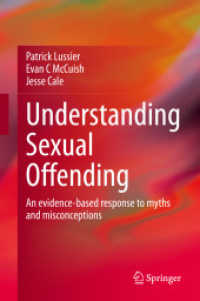- ホーム
- > 洋書
- > 英文書
- > Psychology
Full Description
This book offers an expert synthesis of the scholarly literature on approaches to decolonial psychology, its historical foundations, education and training, and psychological practice.
From its inception, psychological science and practice in the United States has been framed predominantly by Eurocentric epistemologies. As a result, oppressed people have internalized the belief that their culture and values are inferior to those of dominant groups. Infusing a decolonial lens into psychology is one way for the field to become more inclusive and relevant to the numerical majority worldwide.
Decolonial psychology creates space and methods for oppressed and impoverished communities to radically imagine their existence outside of the superimposed borders of coloniality, neoliberalism, racism, and other systems of oppression. It emphasizes how people's subjectivity and connections to diverse social groups are influenced by history, context, and oppression how these populations actively resist and survive attacks on their humanity and how knowledge production is shaped not only by how data is interpreted but also by the questions asked.
The chapters in this book provide an opportunity for readers to deepen their understanding of how colonization and coloniality impacted knowledge creation in society and the field of psychology, including thought-provoking resources that explore the subject matter. The book also underscores how coloniality continues to reverberate in many aspects of psychology today. Collectively, the authors invite readers to resist engaging in psycolonization by generating ideas and pathways to help reclaim, honor, and celebrate Indigenous ways of knowing and being. The volume offers guidance on methods to disrupt psycolonization and its epistemic violence, helping to provide a roadmap to decolonial psychology and anticolonial futures.
It is time to confront the limitations of mainstream psychology. This book will help psychologists at all levels anchor their research, teaching, and practice in decolonial methods and practices.
Contents
Contributors
Series Foreword
Frederick T. L. Leong
Foreword
Gayle Skawen:nio Morse and Marie C. Weil
Acknowledgments
Introduction: Decoloniality as a Transformative Force in Psychology: An Orientation to This Book
Hector Y. Adames, Nayeli Y. Chavez-Due amp ntilde as, and Lillian Comas-D amp iacute az
Part I. History and Knowledge
Chapter . Colonial Mentality: Manifestations, Operations, and Psychological Implications
Hannah L. Rebadulla, Jonathan U. Guerrero, and E. J. R. David
Chapter 2. Naming and Unlearning Psychological Coloniality
Cristal amp iacute s Capielo Rosario, Eduardo Lugo-Hern amp aacute ndez, and Lo amp iacute za A. DeJes amp uacute s Sullivan
Chapter 3. Engaging With Decoloniality, Decolonization, and Histories of Psychology Otherwise
Sunil Bhatia, Wahbie Long, Wade Pickren, and Alexandra Rutherford
Part II. Science, Methods, and Epistemic Justice
Chapter 4. Decolonizing and Building Liberatory Psychological Sciences
Helen A. Neville, B. Andi Lee, and Amir H. Maghsoodi
Chapter 5. Beyond Decolonization: Anticolonial Methodologies for Indigenous Futurity in Psychological Research
Jillian Fish and Joseph P. Gone
Chapter . Disciplinary Disruptions: Strategies Toward a Decolonial Community Psychology Praxis
Jesica Siham Fern amp aacute ndez
Chapter 7. Decolonizing in a Transnational Feminist Commons Perched Precariously Between the Academy and Movements for Justice
Adreanne Ormond, Puleng Segalo, Mar amp iacute a Elena Torre, and Michelle Fine
Part III. Education, Professional Training, and Mentoring
Chapter 8. Decolonizing the High School and Undergraduate Curriculum
Edil Torres Rivera and Ivelisse Torres Fernandez
Chapter 9. Unlearning Colonial Practices and (Re)envisioning Graduate Education in Psychology
Carrie L. Casta amp ntilde eda-Sound, Miguel Gallardo, and Susana O. Salgado
Chapter . The Decolonial Mentoring Framework: Advancing an Anticolonial Future in Psychology and Beyond
Mackenzie T. Goertz, Hector Y. Adames, Chelsea Parker, Nayeli Y. Chavez-Due amp ntilde as, Radia DeLuna, and Jessica G. Perez-Chavez
Chapter . Wise Face, Firm Heart: Ethics and Decolonial Psychology
Melinda A. Garc amp iacute a
Part IV. Psychotherapies
Chapter 2. Decolonial Psychotherapy: Joining the Circle, Healing the Wound
Lillian Comas-D amp iacute az and Frederick M. Jacobsen
Chapter 3. Decolonizing Psychoanalysis: Anti-Blackness, Coloniality, and a New Premise for Psychoanalytic Treatment
Daniel Jose Gaztambide, Fabo Feliciano-Graniela, Jose Luiggi-Hernandez, and Edlyane Veronica Medina Escobar
Chapter 4. Decolonizing Feminist Therapy
Thema Bryant, Carolyn Zerbe Enns, and Yuying Tsong
Part V. Queer Futures, Self-Care, and Community Care
Chapter 5. Moving Psychology Toward Anticolonial Queer Futures
Della V. Mosley, Pearis L. Jean, Brittany Bridges, Maria Sobrino, Jeannette Mejia, Sunshine Adam, Garrett Ross, and Roberto Abreu
Chapter . Your Self-Care Is Made of Capitalism: A Decolonial Approach to Self and Community Care
Arianne E. Miller and Nellie Tran
Index
About the Editors








